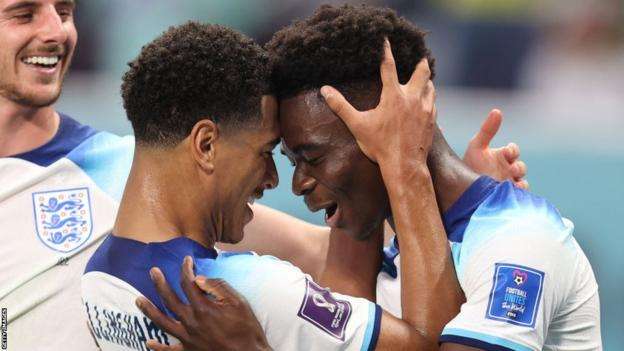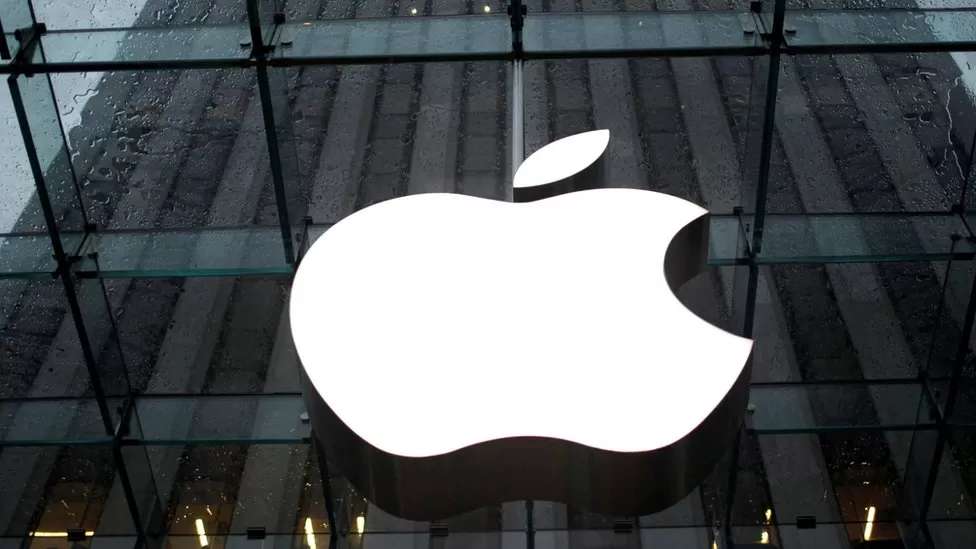England's current squad was handed the bouquet - some might say the burden - of being labelled "The Golden Generation" after the recent win in Scotland.
Those three words, uttered in this case by former Liverpool captain and manager Graeme Souness, might send shivers down the spines of long-time England observers who have heard it all before, only for that promise to be left unfulfilled.
They were most strongly applied to Sven-Goran Eriksson's side, who reached Euro 2004 in Portugal and the World Cup in Germany two years later but never even touched silver.
Euro 2004 saw huge underdogs Greece secure a stunning victory in the final against the hosts in Lisbon's iconic Estadio da Luz (Stadium of light).
Those of us in Portugal then would rank England's failure to win that tournament as a missed opportunity to rank alongside any in recent years, such as the 2018 World Cup semi-final loss to Croatia and the Euro 2020 final defeat by Italy on penalties at Wembley.
In 2004 England's side was littered with world-class players in all positions, apart from goalkeeper, but they went out on penalties to Portugal in the quarter-finals, and then did exactly the same - at the same stage - in Germany in 2006.
So is this really England's new "Golden Generation"? And how many of the new breed would get in the 2004 side ahead of the old guard under Eriksson?
I give my verdict below, before you get the chance to pick your own team from the 2004 vintage and the class of 2023.
Goalkeeper
England's goalkeeper at Euro 2004 was David James, who had a fine career for clubs and country, with his international career stretching from his debut against Mexico at Wembley in March 1997 until his 53rd and final cap when Fabio Capello's side went out of the 2010 World Cup in South Africa with a 4-1 loss to Germany in Bloemfontein.
James was highly regarded and well-travelled, featuring for clubs such as Liverpool, Aston Villa, West Ham United, Manchester City and Portsmouth, and playing in Pompey sides that won the FA Cup against Cardiff City in 2008 and lost the final to Chelsea a year later. He also won a League Cup with Liverpool in 1995.
He did suffer from inconsistency though, so would the current incumbent Jordan Pickford, who has played in a World Cup semi-final and Euros final, get in ahead of him?
The Everton stopper is now ahead of James with 55 England caps, including 26 clean sheets. When measured in Opta stats he has made no errors leading to goals and has a save percentage of 75.3%.
Pickford has been remarkably consistent for England and outstanding for Everton, even throughout their desperate struggles. He has matured on every level and would be one of the few who gets the nod ahead of the 2004 vintage England team.
Defence
No joy for the current crop here as defence is one of England's current Achilles heels, while the class of 2004 was of the highest quality right across the back four.
In 2004, England had Gary Neville, still outstanding at Manchester United, at right-back and a central defence of power and class in Chelsea captain John Terry and Arsenal's Sol Campbell, while Ashley Cole was arguably the best left-back in the world at that time.
Anyone who saw Cole's epic battle with the magnificent young Cristiano Ronaldo in England's quarter-final in 2004 was witnessing one of the great individual defensive performances as the pair traded footballing blows through the intense heat of the Lisbon night.
In addition, Eriksson was without Rio Ferdinand as he served a suspension for missing a drugs test while his squad also had Liverpool's Jamie Carragher, Ledley King of Tottenham and the versatile Phil Neville from Manchester United.
Who could break into that back four from Gareth Southgate's team? What would Southgate give for defensive riches on that scale when he lands in Germany next summer?
Some might argue for Manchester City's Kyle Walker at right-back and team-mate John Stones in central defence, but in reality none of England's present squad could unseat the 2004 team.
Liverpool's Trent Alexander-Arnold is superior creatively to Neville but even Southgate does not appear to fully trust him defensively and selects others ahead of him.
Midfield
This is a thorny one as the make-up of England's midfield in 2004 was peerless when measured in world class talents, but questionable on balance as Eriksson tried to shoe-horn four Premier League greats into the same area of his team.
Look across England's midfield in Portugal and, on the surface, it is hard to see a flaw. David Beckham. Frank Lampard. Steven Gerrard. Paul Scholes.
Dig deeper, however, and what seemed too good to be true was indeed too good to be true.
Lampard and Gerrard's partnership always fell short of expectations as many simply felt they were just too similar to provide a perfect central balance, someone always having to rein in natural attacking instincts to provide a shield, while Eriksson's decision to stick the genius of Scholes on the left flank effectively hurried him into international retirement as he was not being used in his best, more central position.
Gerrard was also below his best, perhaps distracted by speculation about a move to Chelsea - which resurfaced again in 2005 - that followed him around the tournament.
Eriksson decided against the more pragmatic choice of Bayern Munich's Owen Hargreaves or Nicky Butt of Manchester United, so there are certainly two members of England's current midfield who can state a very strong case for inclusion that might offer the "X factor" that lavishly gifted centrepiece of 2004 lacked.
Jude Bellingham may be only 20 but Southgate can now put one of the world's best players at the heart of his team, while Arsenal's Declan Rice provides an outstanding platform for any midfield.
The problem would be the one Eriksson could never solve. Who would be left out?
Attack
England's current attacking options are one area where 2023 offers a much wider and more varied choice than 19 years ago - but what quality England possessed back then.
The biggest story from 2004 was the arrival on the global stage, at least in the England context, of Everton's 18-year-old Wayne Rooney, who had already rapidly risen to prominence in the Premier League.
The manner in which he bullied France in England's opening game grabbed the world's attention and left Portugal in the grip of "Roomania" as he followed up that headline-grabbing opening with doubles against Switzerland and Croatia in the subsequent group games.
Eriksson and England will be forever left wondering what might have been had Rooney not been forced off against Portugal in the quarter-finals after only 27 minutes with a broken foot when they already led through Michael Owen's goal.
Owen, while maybe not quite at the level of greatness of earlier years and about to make a move from Liverpool to Real Madrid, was still world-class. Would the more rounded game of England's current highest goalscorer and captain Harry Kane, with 59 goals in 86 caps, be a better foil for Rooney, whose record of 53 he surpassed, or would he fit better with Owen, who bagged 40 England goals himself?
There is certainly a strong case for finding a place for Kane.
Where Southgate's current squad is better placed is for all-round options in attack, allowing greater flexibility for systems, as he is able to call on Arsenal's Bukayo Saka, Manchester City pair Phil Foden and Jack Grealish, and Manchester United's Marcus Rashford.
It certainly offers more variety and options than 2004, when the alternatives to Owen and Rooney were Aston Villa's Darius Vassell, chosen ahead of Jermain Defoe and Liverpool's Emile Heskey. Chelsea's Joe Cole and Newcastle United's Kieron Dyer were also available to Eriksson.
The managers
Sven-Goran Eriksson
Eriksson's main fault was that he seemed, at times, star-struck - especially when it came to David Beckham. It was perhaps understandable but England's captain never looked fully fit despite recovering from a broken metatarsal in time for the World Cup in Japan in 2002. The manager also persisted with Beckham when he was well short of his best in 2006.
The Swede's plan always seemed to be 'just throw his best players at it and hope for the best', rather than work out the most effective team, although he was unlucky with Rooney's injury in 2004 and also the fact Manchester United's striker suffered a foot problem before the World Cup in Germany two years later, delaying his entry into the tournament, which ended with his red card against Portugal in the quarter-finals in Gelsenkirchen.
Eriksson was also never able to quite overcome club divisions in his squad, where the rivalries between Chelsea, Liverpool and Manchester United were never fully resolved.
Three quarter-finals from three tournaments was respectable - but should have been more.
Gareth Southgate
The best record of any England manager since Sir Alf Ramsey, reaching a World Cup semi-final, a Euros final and another World Cup quarter-final.
Southgate has his critics who suggest he is too often gripped by conservatism, but he can point to his record in major tournaments and will have a great chance to put matters right in Germany with his current squad.
He, like Eriksson, can also be questioned about being too loyal to players, especially Manchester United's Harry Maguire, but is at least prepared to leave big names out - see Raheem Sterling and eventually Wayne Rooney.
However, Southgate knows he needs that tournament win on his CV to totally silence doubters.
Is this England's golden generation?
No.
Golden generations win big prizes and until this current England side achieve that, ending a wait for the men's team that stretches back to 1966, then they cannot be given such a label.
The same applied to the 2004 vintage England. The tag was put on them but never justified because they came up short when it mattered.
If England win next summer's Euros in Germany, and they have a huge opportunity, then the argument can be revisited.








